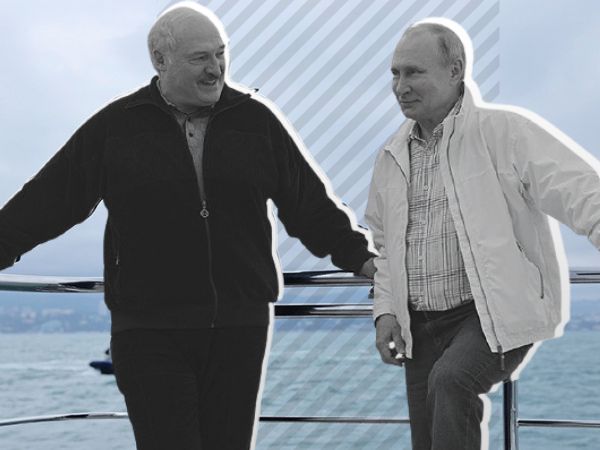When Putin suggested that Lukashenko should take a sea dip, observers passed this small gaffe off as a joke. Who would enjoy a sea swim with water temperature in the Black see hardly reaching +16.
But the Belarus president chose to do so for the idea came from Putin.
It is quite transition –from being a self-willed leader of Russia’s ally state to the Moscow-controlled local ruler of the subjugated province that is clinging to remains of its waning sovereignty, and it is all due fallout from the scandal with a forced landing of a Ryanair plane and arrest of blogger Roman Pratasevich and his girlfriend Sophiya Sapega.
Ahead of the talks with Lukashenko, Putin was rather articulate on Russia’a stance to Belarus and its leader.
‘We are addressing the issue of the union state, and we are doing so as we agreed on in order to follow interests of both Belarus and Russia. We are confidently advancing to this [goal] .. The thing is that it has to be done consequentially, without rush and going forward, but rather proceed in stages,’ said Putin in a speech addressed for his Minsk guest.
Proceeding ‘without rush’ is today’s key message from Putin.
It marks departure from the previous approach that saw the Kremlin constantly pushing on with integration agenda and urging Lukashenko to discuss ‘integration schemes’ that were set to add substance to plans of establishing their union state Russia has been seeking for several decades.
After some period of isolation on the international scene, Lukashenko was seemingly eager to get Belarus relations with West back on track. The policies used by Moscow in Georgia and Ukraine also played a role in such shift. Compared to the Russian leader who didn’t stop short of using force, Lukashenko gave the impression of a moderate autocrat eager to lessen dependence on Russia.
His attitude to Ukrainian crisis was also different. While Russia lashed out at Ukraine branding the post-Maydan government as junta, the Belarusian leader held a meeting with Ukraine’s interim president Oleksandr Lukashenko.
He soon resumed his foreign trips and welcomed visits of the US Secretary of State Mike Pompeo and the US president security top advisor John Bolton. The Belarusian capital became the diplomatic platform for international talks on Donbas with German chancellor and French president in attendance.
If Lukashenko had managed to hold fair presidential elections, relations with the US and the EU would be shaping up nicely.
He failed to do so for he knew he was not able to win those elections in a fair way. Protests that swept through the country after the rigged presidential vote were met with reprisals and brutality from law-enforcement, which has led to the most dramatic rift between Lukashenko and western countries since 1990s.
Back then, few would put in question legitimacy of his authority despite all the acquisitions over the unlawfully dissolved parliament and his involvement with disappearance of political opponents. The recent incident turned Lukashenko into a political pariah with virtually all Belarus neighbors now refusing to recognize him as a legitimate leader. And a last straw Belarusian president can clutch at is Moscow.
After ‘hijacking’ of the Ryanair flight things are literally beyond repair for Minsk. Before the incident, the Belarusian authoritarian rule had somewhat the regional dimension. The region has had a notable history of clashes between authoritarian rulers and their people.
The news about forceful grounding of a Ryanair flight carrying a dissident came as a shock to European countries. It became clear that the Belarus situation should be addressed in urgent and harsh manner to deter other mischievous regimes from pulling the same stunts in future.
Volodymyr Putin probably was gloating over the situation and it doesn’t really matter if Russia’s intelligence agencies were involved in the story or not.
Fixing up a dialogue with civilized world after such airspace ruse is now a long shot for Lukashenko. With the new status of a pariah, he turns his own country in yet another Crimea and has to deal with western sanctions on a par with those put in place against Moscow. The only thing that makes the situation different from Crimean story is that Belarus still enjoys some formal attributes of sovereignty.
Yet, now it is the Kremlin calling the shots over its sovereignty attributes, and Volodymyr Putin needs no rush pushing on his agenda on Minsk.
Does he need Belarus as an ‘antithesis to Ukraine’ and a key loyal ally in the post-Soviet dominions? Or should he seek the union state turning Belarus in another reclaimed ‘Crimea’ before presidential elections in Russia, which can, once again, help reinstate his own status of the ‘collector of Russian lands’.
From now on, we should not be under the illusion that Lukashenko’s regime can act as a guarantor of Russia’s non-agression. After all, he could hardly hold Moscow back. Playing Ukraine and Georgia against Russia, he would jump at the chance of getting Moscow handouts in return for its support of any military engagement.
It looks that this trade scheme is coming to an end.

 Creative director of ROA Patrick Stengbye talking about the shoes he chooses for running, what the brand will surprise us with in 2024 and President Zelensky’s style
Creative director of ROA Patrick Stengbye talking about the shoes he chooses for running, what the brand will surprise us with in 2024 and President Zelensky’s style 





